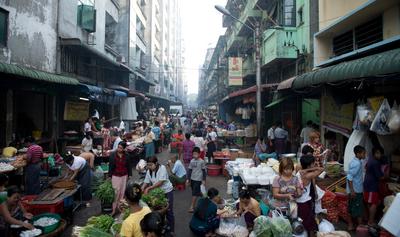For now, reversal of the progress in Myanmar seems unlikely, given what the military leadership now have riding on it, nationally and internationally (as it assumes the chair of ASEAN in 2014), but how bumpy the road ahead is will depend much, if not crucially, on whether political reform can be entrenched through the prosperity that only economic reform can bring.
The good news is that the process of economic reform has begun. As Vikram Nehru notes in this week’s lead essay, the day of the opposition’s landslide election victory also saw the first foreign exchange auction in Rangoon, establishing a more realistic exchange for the kyat against the US dollar (a slide from the old official rate of 8.5 kyat to a market rate of 818 kyat to the dollar). Getting a realistic price on the currency is the first big step in getting economic incentives and disciplines right in the Myanmar economy.
Reform of the foreign exchange regime is only the very first step. For it to work there will need to be an independent central bank. A raft of trade and other regulations will need to be lifted to make effective the relationship between the prices of goods and services in local currency and those purchasable in international markets using foreign currencies. Myanmar has access to international advice, through the IMF, the World Bank, the Asian Development Bank and the United Nations, in implementing economic reform, but ultimately success will depend on calibrating the implementation of economic reform to domestic political and economic circumstances. Much of the country is desperately poor and there will need to be immediate pay-off from reform to underpin confidence that change will generate higher living standards and reduce poverty. Success will build a constituency for further change. Reforms will be key to unleashing the binding constraints that have held back economic growth.
Nehru identifies five reform priorities.
The first is to establish financially viable government, able to fund essential economic, civil and security infrastructure transparently through the national budget. Only then will the people of Myanmar escape the tyranny of being held hostage to the whims of arbitrary extra-legal power. This will allow the state to achieve two critical objectives: it will increase certainty by financing local government and military organisations properly and transparently through the budget; and financial viability will also help provide resources (from internal and external sources) to build much-needed infrastructure, such as ports and rural roads, to facilitate non-gas production and exports (rice, pulses, beans and labour-intensive manufactures in particular). Myanmar is fortunate that the prospects of increased exports of gas (now fetching their real value in international currency) will dramatically increase the net earnings of the state-owned Myanmar Oil and Gas Enterprise. Mobilising these earnings for national development is the first critical challenge.
The second priority, according to Nehru, is to allow increased space for economic activity by private entrepreneurs that is free from state or military patronage — and to give banks increased freedom to lend to them (especially in agriculture). ‘Formal laws governing economic activity either don’t exist or aren’t followed’. And actions by the government currently tend to discourage private initiative because they are random and unpredictable. Farmers are restricted in their choice of crops, and rice production is subject to a levy. Investment and increased production depends upon ensuring that the property rights of private investors are respected and protected.
Third, the government needs to eliminate a whole range of restrictions on imports and exports and promote foreign direct investment. Doing so will eliminate the supply bottlenecks that are throttling economic activity and jumpstart non-oil and gas export production. Unless these restrictions are lifted the market-based exchange rate won’t be able to do its job.
A fourth priority is to develop Myanmar’s natural resources — especially natural gas, hydropower, timber and gems — without falling prey to macroeconomic risks or incurring local environmental and social problems. In Myanmar, where the bulk of the country’s natural resources are located in ethnic minority regions that have been seeking autonomy from the centre for decades, getting this right is particularly important. Without adequate safeguards, these regions could see their natural resources depleted rapidly with little long-term development to show for it.
Finally, the government will need to work with the international community to assist in clearing debt owed to the Asian Development Bank and World Bank so that Myanmar can once again tap these institutions for concessional resources. Neither the international banks nor bilateral lenders can take on more debt without a repayment plan. Japan is the biggest creditor (with about US$4 billion in outstanding debt); among multilaterals, the Asian Development Bank and the World Bank, together, are owed in excess of US$750 million.
These are daunting challenges. But, as Nehru concludes, Myanmar’s strategic location and its natural resource wealth give it advantages few countries have. And its place within ASEAN gives it every prospect of coming in from the political and economic cold more quickly than Vietnam was able to after the bitter war with America, not to mention North Korea should it come to make the choice for economic change.
Peter Drysdale is Editor of the East Asia Forum.

